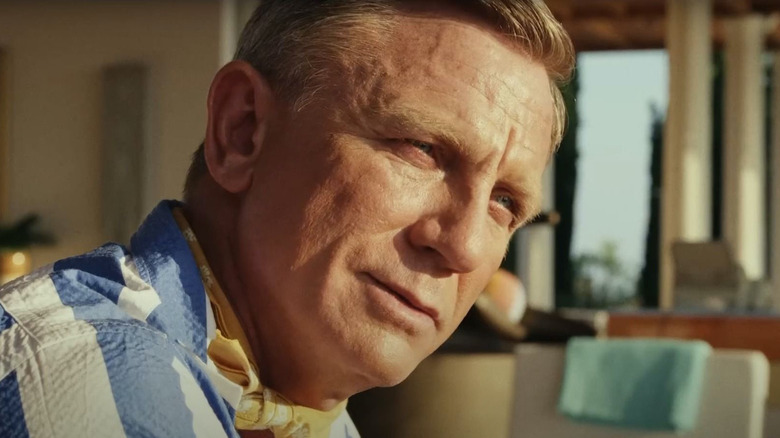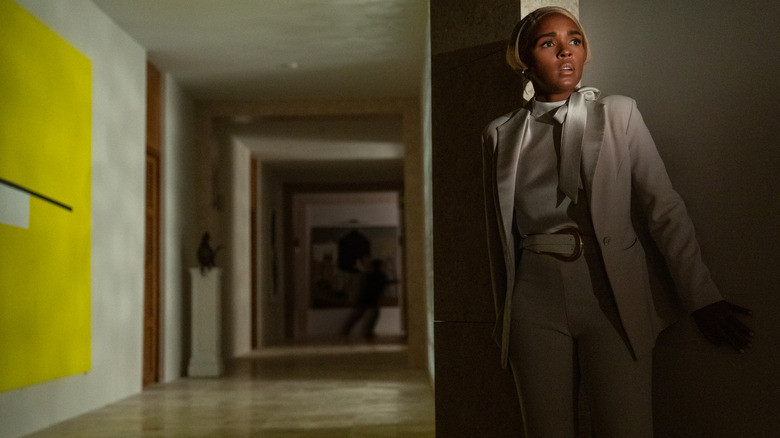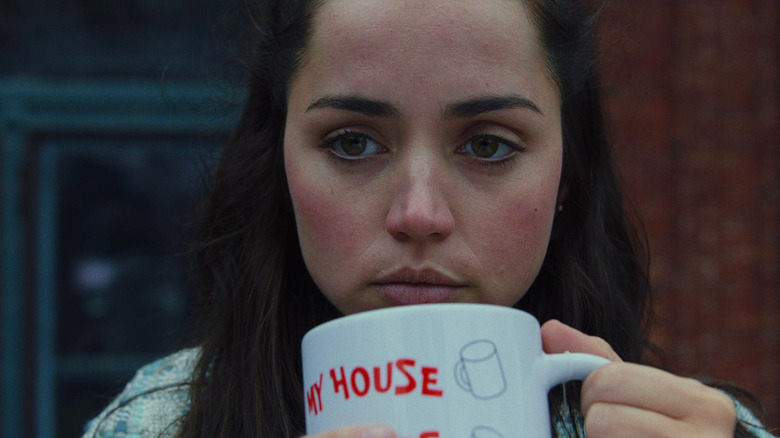Here's Why Benoit Blanc Can't Be The Protagonist In The Knives Out Movies
Benoit Blanc is the not-so-secret weapon of the "Knives Out" franchise. There's certainly no hiding him: Daniel Craig's performance is a highlight of both films and there are plenty of reasons why writer/director Rian Johnson would much prefer Blanc's name as the series subtitle. The Kentucky fried detective is a cigar-smoking, righteously angry, wealth-loathing star! But the very quiet truth of these movies is that, as much time as we spend with Blanc, how much do we really know about the man?
Blanc is introduced in "Knives Out" as though he's a caricature of the famed detective archetype we know so well: frequently called "the world's greatest detective," he's got a reputation that precedes him and plenty of famously solved cases under his belt. And what more do we learn from there? Well, the man obviously loves donuts, is filled with contempt for the wealthy elites he's so often surrounded by, has lots of compassion for the outsiders so frequently caught up in his cases, is dating a very concerned Hugh Grant, and apparently, likes extremely long baths. But it's not as though we know his entire life story. We don't need to. And the films might even be better for it: because the truth is, Blanc isn't the actual protagonist of these movies.
Part whodunit, part Hitchcockian thriller
While interviewing Rian Johnson on the most recent episode of The Filmcast, co-host David Chen points out that both movies see Benoit Blanc enabling another protagonist to solve the mystery, rather than taking center stage himself. Marta in the first movie and Andi in the second. "That was really deliberate," Johnson said in the episode, explaining:
"That's one thing that I think will stay constant, is that the detective can't be the protagonist. There needs to be somebody who has skin in the game and somebody who it's gonna be satisfying at the end, basically, when they win."
Each time he takes on a new case, Blanc is immersing himself in a different world. The first time around it was the exhaustingly rich Drysdale family, with their wild dysfunction and internal strife. They straight-up sucked, but that didn't matter, because Marta was our way in. The second time around, the irritating inner circle of tech billionaire Miles Bron is only made bearable by the mysterious presence of Janelle Monáe's Andi Brand. Both movies have a murder and plenty of clues laid out for us to piece the truth together, but the real appeal is that they revel in character drama and there's always a grounded, emotional story being told in the same puzzle-box mystery breath.
Johnson added, "That all goes back, for me, to — as much as I love murder mysteries, as much as I love whodunits, specifically in movie form — wanting to approach these more as Hitchcock thrillers."
The protagonist is a crucial piece of the puzzle
So what does going the Hitchcockian route look like? For one thing, it means there's more to life (i.e. the movie) than solving the mystery. "Even for myself, as a whodunit nut, the process of clue gathering and crime solving can entertain me in a movie for maybe about 20 minutes," Rian Johnson admitted to The Filmcast. "And then I'm gonna sit back and disengage and think, 'Okay I'm never gonna figure it out. I don't know who dun it. I'm gonna just wait until the thing I never could've guessed is revealed at the end.'"
After a while, that does become the reality of murder mysteries. I've got just as much false bravado as anyone else and always enter every murder mystery convinced that I'll find the solution. But when they're written right, they have a way of shocking us no matter how attuned we are to the details — because the detective always has to be the smartest person in the room. So the mystery can't be all there is.
Referring to the whodunit staple of collecting evidence, Johnson said, "Never leaning on that as the source of entertainment for the audience is a huge part of how I approach these things. And that means having a protagonist. And that can't be the detective because you know the detective is gonna be fine at the end of the movie. You need someone who you actually care about and are worried about."
Both Marta and Andi are in precarious situations — surrounded by wealthy people who couldn't care less about their well-being. We spend much of "Knives Out" worried that Marta will be framed for the murder while Andi might very well be in danger of being murdered in "Glass Onion." They have skin in the game, in a way that Blanc can't possibly match.
Glass Onion came with an extra challenge
The rest of this post includes spoilers for "Glass Onion."
While crafting "Glass Onion," Johnson found this approach especially tricky, because in this story, it isn't until halfway through the movie that the audience realizes Benoit Blanc is not the protagonist. When we learn the truth about Andi — that she's actually Helen, investigating the death of her twin — the story becomes hers. Or, in Johnson's words, "Blanc is kind of like a fake protagonist in the first half." He added:
"When I started writing it, I thought the scary thing was gonna be 'How do I keep the audience engaged in the second half when we're repeating everything?' What ended up being really scary actually is my answer to that was to introduce that protagonist at the midpoint. Even though you've seen her the whole time, we really introduce the character of Helen and give you somebody you care about halfway through the movie. And I counted on that empathy and that emotional engagement to be the thing that keeps you going through the second half."
In the meantime, Blanc fulfilled his fake protagonist role very well. Our brief glimpse into his domestic life (aka playing Among Us in the bathtub) gave us just enough to invest in Blanc's journey: the man is in desperate need of a good case and knowing he's about to solve another mystery is tantalizing all on its own. Add in some restlessness for the famed detective and we're guaranteed a good time!
But in the end, this is nothing compared to the way we invest in heroines Marta and Helen, who have real emotional stakes in the cases being solved. Though he certainly has empathy for their plights and always nudges them toward a satisfying ending, Blanc isn't the one with a vested, emotional interest. He's just the one solving the puzzle.



